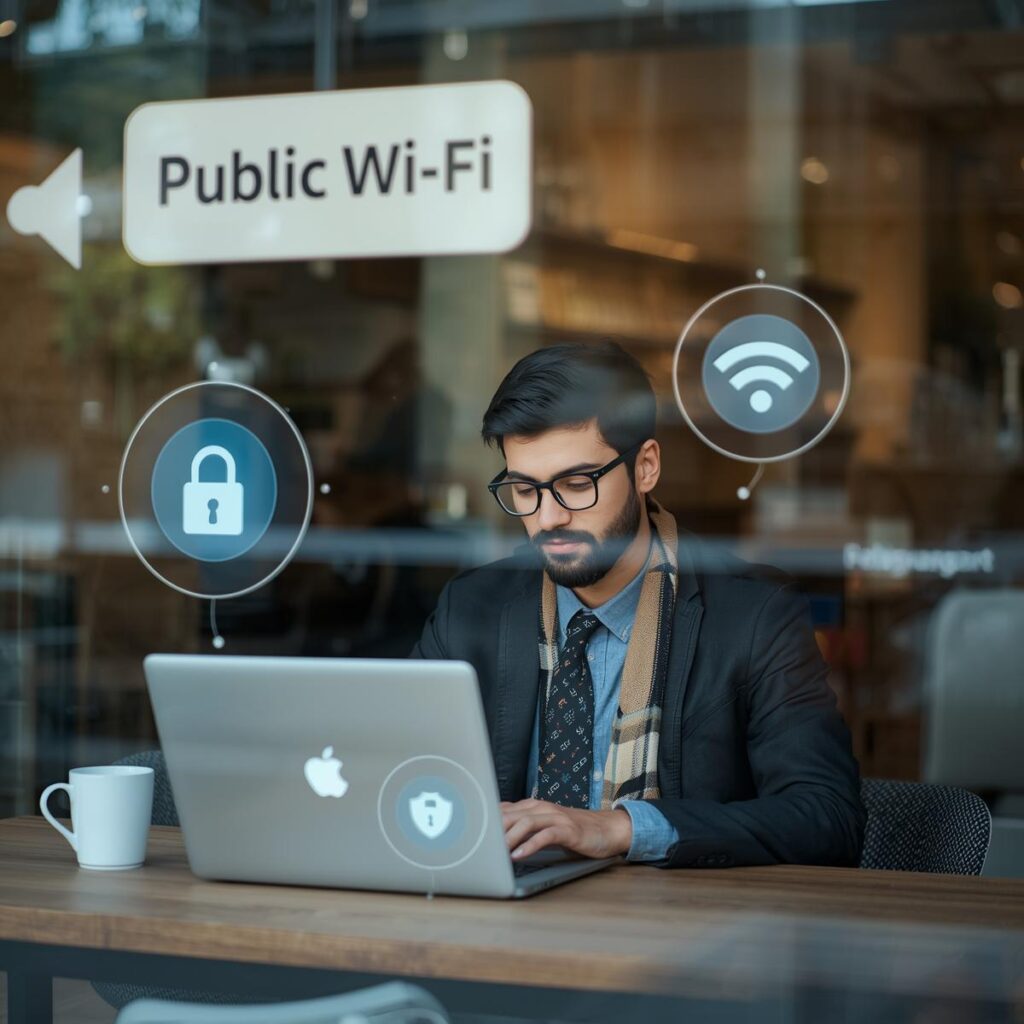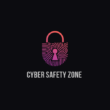
Table of Contents
how freelancers can stay safe on public Wi-Fi is more important than ever. If you’re a freelancer, chances are you’ve spent countless hours working from coffee shops, co-working spaces, hotels, or airports — and that means connecting to public Wi-Fi. It’s convenient, fast, and often free. But here’s the harsh truth: public Wi-Fi is one of the biggest cybersecurity risks freelancers face in 2025
Whether you’re sending client contracts, accessing your bank account, or logging into platforms like Upwork or Fiverr, using unsecured networks can put your sensitive data in the wrong hands. Cybercriminals are getting smarter — and so should you.
In this guide, we’ll explore why public Wi-Fi is so dangerous, how hackers exploit it, and the best ways of how freelancers can stay safe on public WiFi in — without sacrificing convenience or productivity.
Check out the visual version of this blog
Why It’s Riskier Than Ever in 2025
Public Wi-Fi is everywhere now — from coffee shops to coworking spaces to hotel lobbies. But that popularity also makes it a prime target for cybercriminals.
Here’s why it’s especially risky for freelancers:
Unencrypted networks:
Many public networks don’t encrypt your data, meaning anyone on the same network can intercept it.
Man-in-the-middle attacks:
Hackers can place themselves between you and the website you’re visiting, capturing sensitive information like login details or payment data.
Fake hotspots:
Cybercriminals often set up rogue Wi-Fi networks with names like “CoffeeShop_Free_WiFi” to trick users into connecting.
Session hijacking:
Even if you’re on a legitimate network, attackers can hijack your session and gain access to accounts you’re logged into.
For freelancers dealing with client files, contracts, and personal financial data, the consequences can be severe — from identity theft to data leaks to losing valuable client trust.
1.How Freelancers Can Stay Safe on Public Wi-Fi Using a Trusted VPN
If there’s one rule you follow from this entire article, let it be this: always use a VPN when connecting to public Wi-Fi to protect your data on public WI-FI
A Virtual Private Network (VPN) encrypts your internet traffic and hides your IP address, making it nearly impossible for hackers to snoop on your data — even on unsecured networks.
In 2025, VPNs have become more advanced, faster, and easier to use. They’re essential for freelancers who regularly work remotely.
Some top-rated VPNs for freelancers include:
- Surfshark VPN– Affordable, fast, and packed with privacy features.
- NordVPN– Great for speed and strong security protocols.
- Proton VPN– Offers a reliable free plan with strong encryption.
👉 Even if you’re just checking emails, make using a VPN a **non-negotiable habit** on public networks.
2.Simple Settings That Help How Freelancers Stay Safe on Public Wi-Fi
Many laptops and smartphones automatically connect to known Wi-Fi networks. That’s convenient — but also risky.
Attackers can set up a rogue network with the same name as one you’ve connected to before (e.g., “Starbucks Wi-Fi”) and gain instant access to your device when it auto-connects.
What to do
- Disable auto-connect in your device’s Wi-Fi settings.
- Make sure you manually verify the network name with the staff before connecting.
3. Enable Two-Factor Authentication (2FA) Everywhere
Even with strong passwords, if a hacker intercepts your credentials over public Wi-Fi, they could gain access to your accounts. That’s where two-factor authentication (2FA) saves the day.
2FA adds an extra layer of security — requiring a code from your phone or authenticator app in addition to your password.
For freelancers, enabling 2FA on platforms like Upwork, Fiverr, Google Workspace, and PayPal is essential.
Pro Tip:
Use an authenticator app like Authy or Google Authenticatorinstead of SMS for better protection.
4. Best Practices for How Freelancers Can Stay Safe on Public Wi-Fi
Even with a VPN, it’s best practice to limit what you do on public networks. If possible, avoid logging into online banking, payment platforms, or sensitive business accounts when you’re connected to public Wi-Fi.
If you must access them try these public Wi-Fi safety tips for freelancers :
- Always check for “HTTPS” in the website URL.
- Prefer using mobile data for sensitive transactions.
- Log out as soon as you’re done.
5. Use a Personal Hotspot When Possible
Another proven method for how freelancers can stay safe on public Wi-Fi in 2025 is using a secure personal hotspot.The safest Wi-Fi connection is the one you control. Many freelancers now use their phone’s personal hotspot feature instead of connecting to public networks.
Modern cellular networks are encrypted, making them far more secure. If you have an unlimited data plan or are handling sensitive information, using your hotspot is a simple but effective solution.
6. Keep Your Devices Updated and Secure
Outdated software is a hacker’s best friend. Security vulnerabilities are often exploited over public networks — and freelancers are frequent targets because they often use the same laptop for personal and client work.
Make sure to:
Enable automatic updates for your operating system and apps.
- Use a reliable antivirus tool (like Bitdefender or Malwarebytes
- Regularly review your device’s security settings and firewall.
7. Encrypt Your Files and Use Secure File-Sharing Tools
If you often share sensitive documents or client data over public Wi-Fi, encryption is your best defense. Tools like Proton Drive or Tresorit allow you to encrypt files before uploading or sending them, adding an extra layer of security.
Additionally, use secure file-sharing tools that support end-to-end encryption — a must-have for freelancers collaborating remotely.
8. Log Out and “Forget” Public Networks After Use
When you finish your work session:
- Log out of all accounts and services you accessed.
- “Forget” the network so your device doesn’t reconnect automatically in the future.
- Clear your browser cache and saved passwords regularly.
These small habits significantly reduce the chance of unauthorized access later.
Final Thoughts: Stay Smart, Stay Secure
How freelancers can stay safe on public Wi-Fi in 2025 is more important than ever. If you’re a freelancer, chances are you’ve spent countless hours working from coffee shops, co-working spaces, hotels, or airports — and that means connecting to public Wi-Fi. It’s convenient, fast, and often free. But here’s the harsh truth: public Wi-Fi is one of the biggest cybersecurity risks freelancers face in 2025.
Whether you’re sending client contracts, accessing your bank account, or logging into platforms like Upwork or Fiverr, using unsecured networks can put your sensitive data in the wrong hands. Cybercriminals are getting smarter — and so should you.
To recap, here’s how freelancers can stay safe on public Wi-Fi:
- Always use a trusted VPN.
- Turn off auto-connect and verify networks.
- Enable two-factor authentication.
- Avoid sensitive transactions when possible.
- Use your own hotspot or encrypted tools.
- Keep devices updated and secured.
Your freelance career thrives on trust — from clients, platforms, and collaborators. By following these steps, you’ll keep that trust intact and ensure your business continues to grow, no matter where you work.
Resources to Explore
People Also Ask: How Freelancers Can Stay Safe on Public Wi-Fi
1. What’s the safest way for freelancers to use public Wi-Fi?
The safest way for freelancers to use public Wi-Fi is by connecting through a trusted VPN, enabling two-factor authentication on all accounts, and only accessing websites with HTTPS encryption. These steps are key to how freelancers can stay safe on public Wi-Fi without exposing sensitive data.
2. What are the best tools for freelancers to stay safe on public Wi-Fi?
The best tools for how freelancers can stay safe on public Wi-Fi include using a reliable VPN, enabling two-factor authentication, keeping devices updated, and using secure browsers or browser extensions that block malicious scripts.
3. Can a VPN really help freelancers stay safe on public Wi-Fi?
Yes, a VPN is one of the most effective ways how freelancers can stay safe on public Wi-Fi. It encrypts your internet traffic, making it nearly impossible for cybercriminals to see what you’re doing online or steal your data.


Pingback: Cyber Insurance for Small Businesses in 2025: Complete Guide